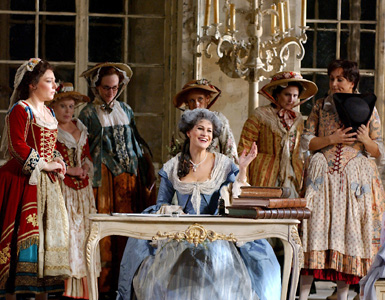Comic opera is a form of opera in which the content is humorous. The term does not have a precise historical meaning but can be applied to any amusing operatic presentation, such as an Italian opera buffa or an English operetta (see Operetta). The term also serves as a translation of the French opera comique.

Most forms of comic opera, such as the German Singspiel (song play) or the English operetta, consist of spoken dialogue punctuated by musical numbers, including arias, ensembles, choruses, and instrumental items. The French operas comiques, which first appeared in the 1700’s, were originally also funny musical stage works with spoken dialogue. But during the 1800’s, the composers of operas comiques broadened their content and even included tragic elements. By the late 1800’s, operas comiques had largely dispensed with spoken dialogue and used music continuously throughout. A Paris theater called the Opera-Comique opened in 1714 and became the home of this type of musical drama.
